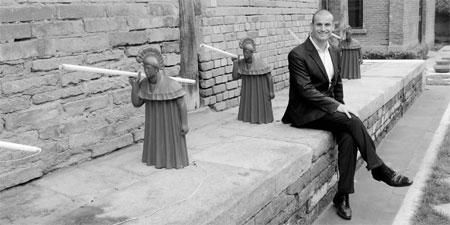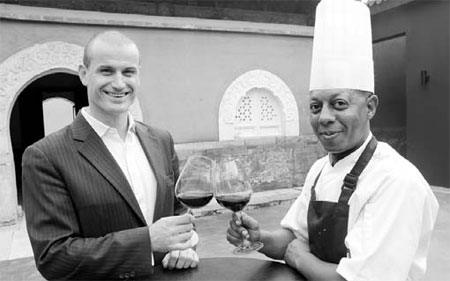Temple master
Updated: 2012-04-01 08:07
By Mark Graham (China Daily)
|
|||||||||||

|
Ignace Lecleir (left) enjoys a quiet moment and a wine sampling with chef Zak El Hamdou. [Mark Graham / for China Daily] |
A Belgian restaurateur turns abandoned historical site into a gourmet's delight, Mark Graham reports.
Ignace Lecleir has worked in some of the world's finest dining rooms and knows a special venue when he sees one. So when the Belgian restaurateur was offered the chance to open a gourmet restaurant in a 600-year-old Beijing temple compound - a place once used as a place of study by tutors to the Chinese emperor - he jumped at the chance.
Lecleir, who has worked at the Dorchester in London, on luxury cruise ships and in Michelin-starred dining rooms, had not operated his own business before. But his years of experience told him this was the chance of a lifetime.
"It is a big gamble but it is the right time in my life, it is the right moment," he says. "I think Beijing has a lot of opportunities and I do like the city, it has something unique to offer."
When Lecleir first viewed the site, it was in a state of disrepair after years of neglect. Its last known use was as a factory, used to produce the city's first black-and-white television sets, back in the 1960s.
Few people realized the compound existed, even though it is only a short distance from the northeastern perimeter of the famous Forbidden City. Lecleir himself had been down the traditional hutong during training runs for a marathon race, but had no idea it contained such a hidden treasure.
Research has revealed that during the reign of Emperor Yongle in the Ming Dynasty (1368-1644), the imperial printing workshops were located there, employing a team of almost 1,000 scholars and artists who worked to produce Buddhist sutras and imperial texts for the emperor's religious teachers.
"I used to run through these hutong for a year and never saw the temple," recalls Lecleir. "You are in the middle of a city of 20 million people and it is quiet, you walk outside and it is so relaxing; sometimes I need an extra espresso in the middle of the afternoon; it is so quiet.
"I feel I have been living here for years, I spend a lot of time here and you almost feel that you are in a small village. The moment you go to the big street, it is bustling and vibrant again."
He originally came to Beijing to work for Maison Boulud a Pekin, the Beijing outpost of celebrity French chef Daniel Boulud. Under his smooth stewardship, it was widely recognized as one of the best independent restaurants in the city, with superb gourmet fare and slick service.
The new operation, Temple Restaurant Beijing, has a menu prepared by the Moroccan-British chef Zak El Hamdou, with food that is described as contemporary European, featuring dishes such as roasted turbot with a basil crust, crispy suckling pig with mashed potato and spiced apple and ravioli with roasted pumpkin.
Business has been brisk, even though the restaurant opened in the dead of winter, when people tend to venture out less. Corporate events have also been held there, using the original wooden temple buildings for cocktail parties.
"I want to have an old-school approach, a place where you feel well taken care of. It will be calm, and entering will be almost like a voyage."
That voyage, through the archway where the emperor and his retinue probably walked in imperial days, en route to Tibetan Buddhist religious ceremonies, brings diners initially into a spacious courtyard. It houses several ancient buildings, with paintwork and peeling wood that have purposely been left untouched, to ensure historical verisimilitude.
Lecleir aims to give it back some of the majesty and pizzazz it would have had in earlier centuries, by employing the high hospitality standards he acquired in France and Britain.
"When I worked there I learned the British way, the gentleman approach to running a hotel," he says. "It was very organized and disciplined and calm - the royal family would come to functions there and Tom Cruise was a regular visitor when he was in town.
"Later when I worked for Crystal Cruises as a sommelier, I learned how to work and how to live in a close environment with many different people; the ship had 500 passengers, 600 staff and 56 different nationalities."
Experience of dealing with so many diverse cultures helped Lecleir adapt quickly to Beijing; his endlessly patient and meticulously detailed approach ensures that staff fully understand the Western style of fine dining.
Lecleir has three children with his wife Jennifer, whom he met when she was a passenger on his cruise ship.
"I feel very fortunate because it does not feel like work to me," he says. "Even when I am not working I like to do research on restaurants. I like to spend time with the family, of course, but often I relax by doing something to do with the business."
Contact the writer at sundayed@chinadaily.com.cn.
Today's Top News
Rescuers race against time for quake victims
Telecom workers restore links
Coal mine blast kills 18 in Jilin
Intl scholarship puts China on the map
More bird flu patients discharged
Gold loses sheen, but still a safe bet
US 'turns blind eye to human rights'
Telecom workers restore links
Hot Topics
Lunar probe , China growth forecasts, Emission rules get tougher, China seen through 'colored lens', International board,
Editor's Picks

|

|

|

|

|

|






